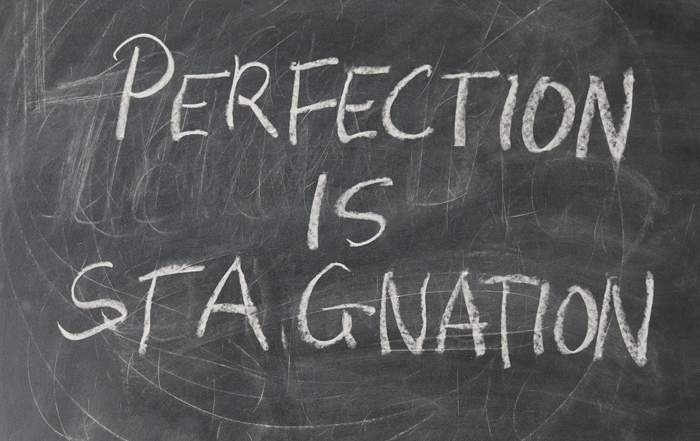Are you a perfectionist? If your immediate answer isn’t ‘no’, chances are you are. Perfectionism is a common theme during our coaching sessions. Wanting to deliver above and beyond good results. Preferably anytime, any place, at any cost. Both at work and at home. Did you know that it’s not smart at all to be perfect? Actually, striving for perfect results, goes at the expense of everything, and no one is better off. Not the results, not your annual assessment and certainly not you, as a person. Fortunately, there are some things you can do about it!
Tal Ben-Shahar, author of amongst others The Pursuit of Perfect, distinguishes two types of perfectionism. The first kind is healthy, the second downright harmful. Perfectionists reject reality, and hold impossible standards for themselves. They try to meet these continuously, are blind to small triumphs and thus make success unreachable. This results in pain, suffering and mental illnesses. Perfectionism is a major cause of stress symptoms, and makes you unhappy. Low self-esteem, eating and panic disorders, depression, chronic fatigue, burnout and alcoholism occur regularly among those who strive for absolute perfection, knows self-proclaimed ‘recovering perfectionist’ Ben-Shahar.
People from the healthy, realistic kind the former Positive Psychology Professor at Harvard University calls optimalists. They accept reality and try dealing with it*, he says.

Your manager doesn’t want perfection: ‘Takes too long, too expensive.’
Train the optimalist in you
Good news: no one is 100% a perfectionist or 100% an optimalist. You’re always somewhere in between. Often times it varies from situation to situation which type you are. In certain areas and at certain times you will be more perfectionistic and at others more optimalistic. (For example, you find that you can not just drop stitch at work, whereas you are very tolerant to yourself when you are exercising your hobby.) And…, even better: you can train yourself to be predominantly an optimalist.
Women suffer from perfectionism more often than men
At work 38 percent of women set high goals and don’t feel like they are able to deliver accordingly.
This applies to 24 percent of men.At home, 30 percent of women feel that they fall short.
Only 17 percent of men worry about this.Source: Auburn University, Alabama, USA (2009)
➜ Tweet this
From fault finder to benefit finder
Which type best describes you? Do you generally try to make the most of it when something goes wrong (optimalist) or do you oftentimes think about what an idiot you really are (perfectionist)? Do you catch yourself doing the latter? Don’t scold yourself, but give yourself permission to be human instead:
One way to do this, is by means of guided meditation exercises, like this one by Tal Ben-Shahar.
When this is done, it is time for the next step: transforming from being a fault finder (someone who makes a habit of detecting faults and criticising) into a benefit finder: focussing on what is going well, and how that could be further improved.
You can do that with these exercises:
Dare to ask for help

You learn more from your mistakes than from your successes.
In our post Learn to fail or fail to learn we explain why it is important to make mistakes. Also good to know, is how important it is to ask for help. At a time when you have not yet put so much time and energy into your work, that you are no longer open to suggestions. Perfectionists do not ask for help that easily, though. Why that is the case? That would mean that you would have to admit that you can not do it all by yourself, and therefore are not perfect. However, once you do ask for help, the benefits are enormous. You discover that you are not alone. That others are in the same boat and would be happy to lend a hand. And that by using each other’s knowledge, skills and ideas, you get much faster and better results.
Scoring with your manager
Contrary to what perfectionists think: your manager doesn’t want perfect results. On the contrary, wasting time and money earns you no good appraisal interviews at all. As one of the first executives Nathalie worked for said: ‘A 7 or 8 score is fine. A 10 takes too long and is too expensive.’
Another reason why perfectionism probably doesn’t make you popular with your boss, is that striving for perfection is often confused with a lack of team spirit, stubbornness and laziness. In fact, perfectionists are the boulders in exhibiting procrastination. However, for a different reason than many executives and close colleagues suggest. Not because they are lazy, but because they are trying to protect themselves. If you do not start doing something, you can not make mistakes, and can not receive negative feedback, is what they think. The result is often the opposite: the attempted protection ends in a bad review or dismissal.
In short: perfectionism is not perfect, nor smart. It blocks the happiness in your life and work, and thus both your personal development and your career. So get the most out of life and become an optimalist! Through self-reflection, training and coaching you can learn to accept failure, including all the emotions that go with it.
More exercises to seize control of your perfectionism?
Sign up for the Wonderful Woman Webinar Week!







Leave A Comment